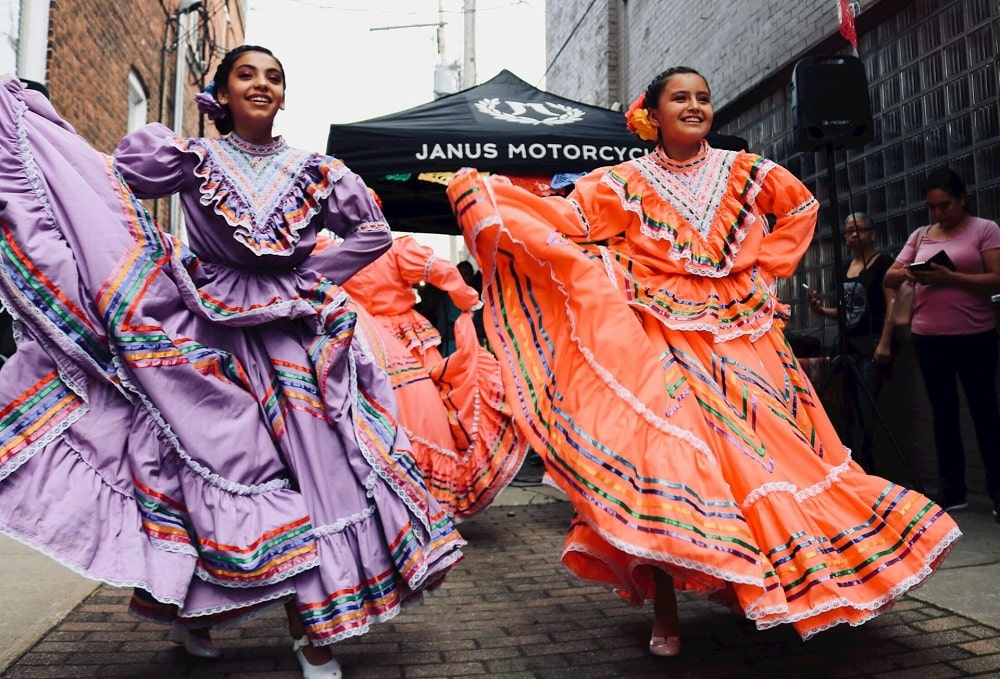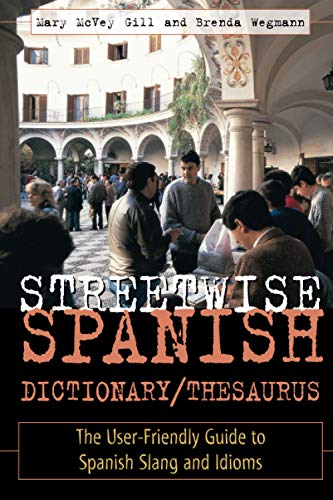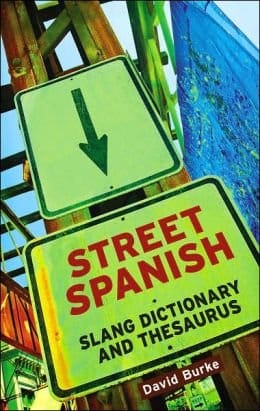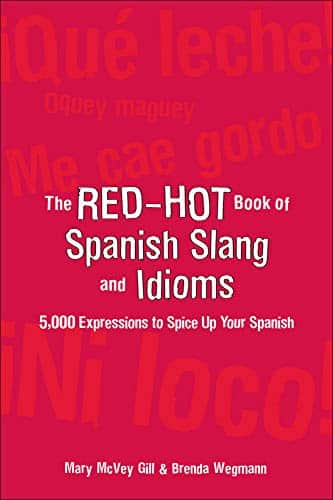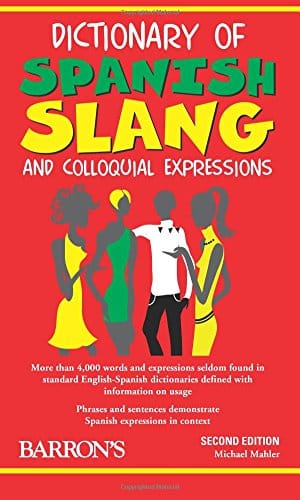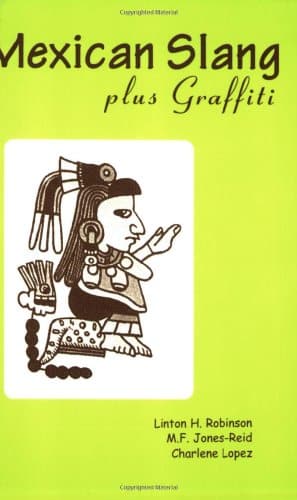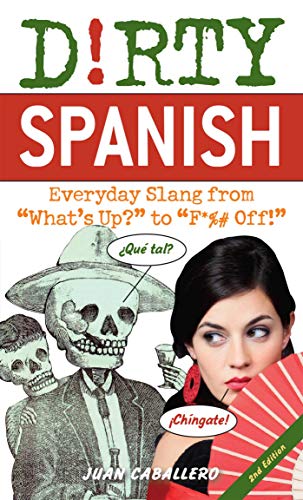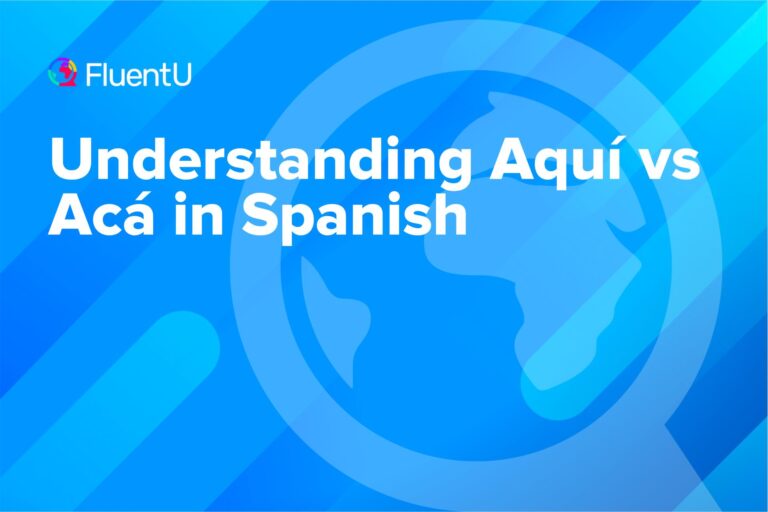Contents
- Common Spanish Slang
- Spanish Slang from Around the World
- Spanish Slang from Spain
- Common Slang in Spanish Latin America
- Argentinian Slang
- Bolivian Slang
- Chilean Slang
- Colombian Slang
- Cuban Slang
- Dominican Slang
- Ecuadorian Slang
- El Salvadorian Slang
- Guatemalan Slang
- Honduran Slang
- Mexican Slang
- Nicaraguan Slang
- Panamanian Slang
- Paraguayan Slang
- Peruvian Slang
- Puerto Rican Slang
- Uruguayan Slang
- Venezuelan Slang
- How to Practice Spanish Slang
- Spanish Slang Dictionaries
- “3,000 Spanish Words and Phrases They Won’t Teach You in School”
- “Streetwise Spanish Dictionary/Thesaurus”
- “Street Spanish Slang Dictionary and Thesaurus”
- “The Red-Hot Book of Spanish Slang and Idioms”
- “Dictionary of Spanish Slang and Colloquial Expressions”
- “Mexican Slang Plus Graffiti”
- “Dirty Spanish”
- Spanish Slang Dictionary
- And One More Thing…
Common Spanish Slang from Around the World (Audio Included)
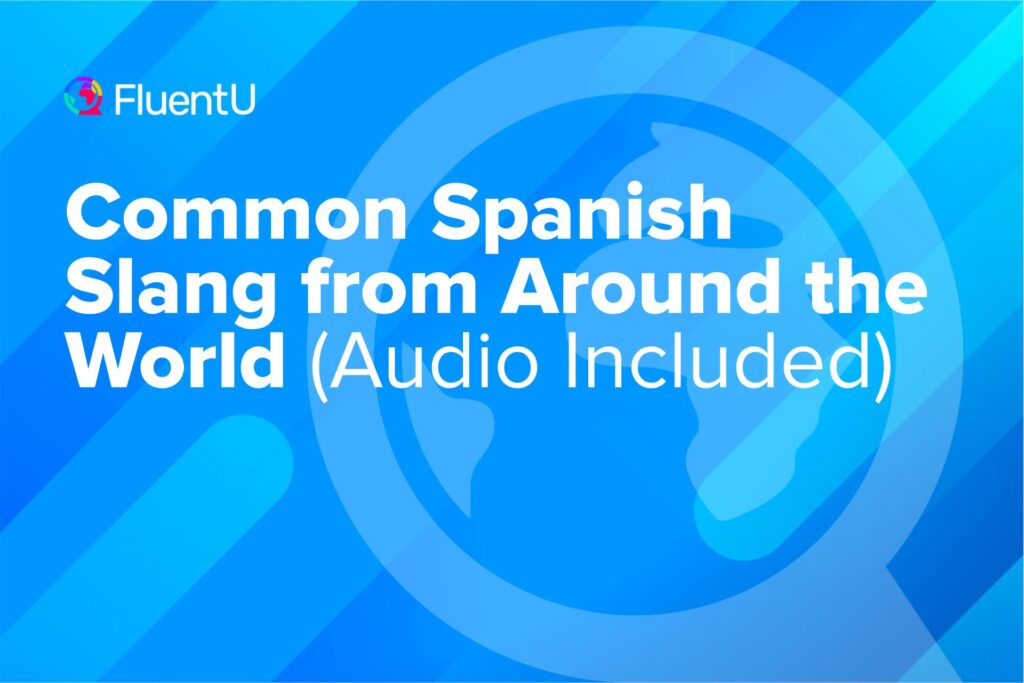
Most traditional Spanish courses won’t teach you much slang (a.k.a. argot or jerga ). But it’s hard to fit in with native speakers without it!
We’re big believers in going off the beaten path with language learning. That’s why our team of Spanish students and native speakers have compiled this mega-list of Spanish slang from around the world.
In this post, you’ll learn slang words along with their literal meanings, explanations and cultural notes. That way, when it’s time for you have a Spanish conversation with native speakers, you’ll fit right in!
Download: This blog post is available as a convenient and portable PDF that you can take anywhere. Click here to get a copy. (Download)
Common Spanish Slang
 Spanish Slang for Friend
Spanish Slang for Friend
There are so many different ways to say amigo (friend). The following slang terms are just the tip of the iceberg.
| Spanish Slang for Friend | Meaning | Country/Region |
|---|---|---|
| Colega | Buddy | Spain |
| Socio | Partner or friend | Latin America |
| Compa | Short for compadre , meaning friend or pal | Mexico |
| Parcero | Friend | Colombia |
| Cuate | Buddy | Mexico |
| Cuateco | Friend | Mexico |
| Pata | Friend | Peru |
| Goma | Friend | Dominican Republic |
| Jato | Friend | Peru |
| Maje | Friend | Honduras, El Salvador, Nicaragua |
| Panita | Buddy | Venezuela |
| Broder | Friend | Honduras |
| Primo | Cousin or friend | Puerto Rico, Dominican Republic |
| Pana | Friend | Venezuela |
| Compita | Short for compadre , meaning friend or buddy | Mexico |
| Camarada | Comrade or friend | Mexico |
| Corillo | Group of friends | Puerto Rico |
| Máquina | Buddy or mate | Argentina |
How to Say “Friend” in Spanish in 45 Ways | FluentU Spanish Blog
With over 100+ ways to say “friend” in Spanish, you’ll soon realize that the word “amigo,” is just the tip of the iceberg. Click here to learn 45 Spanish slang words for…
Spanish Slang for Girl
How do you refer to a girl using slangy language? Use one of the following options! Be forewarned, though: These are generally not the most respectful ways to address a lady.
| Spanish Slang for Girl | Meaning | Country |
|---|---|---|
| Chica | Girl | Universal |
| Mami | Mommy, babe, girl | Puerto Rico, Dominican Republic |
| Guapa | Beautiful girl | Spain |
| Morra | Young girl | Mexico |
| Peque | Short for pequeña , meaning small or young girl | Mexico |
| Chava | Young girl | Mexico |
| Chiqui | Short for chiquita , meaning small or young girl | Latin America |
| China | Girl | Mexico |
| Flaca | Skinny girl | Latin America |
| Gordibuena | Curvy girl | Mexico |
| Gorda | Chubby girl | Latin America |
| Reina | Queen, beautiful girl | Latin America |
| Rubia | Blonde girl | Latin America, Spain |
| Tetona | Busty girl | Mexico |
| Zorra | Promiscuous girl | Spain |
| Chamaca | Young girl | Mexico |
| Pelada | Young girl | Peru |
Spanish Slang for Guy
And now, the guys! Once again, these aren’t always the most polite terms for men, and are generally used among friends.
| Spanish Slang for Guy | Meaning | Country |
|---|---|---|
| Chico | Guy | Universal |
| Vato | Guy | Mexico |
| Chavo | Young guy | Mexico |
| Pibe | Young guy | Argentina |
| Flaco | Skinny guy | Latin America |
| Morro | Guy | Mexico |
| Mero mero | Main man, close guy friend | Mexico |
| Macho | Macho or tough guy | Latin America, Spain |
| Pelado | Young guy | Peru |
| Gallo | Guy | Mexico, Central America |
Spanish Slang for Cool
Knowing all the ways to say “cool” in Spanish is pretty cool, if you ask us.
| Spanish Slang for Cool | Meaning | Country |
|---|---|---|
| Copado | Cool | Argentina, Uruguay |
| Genial | Great or cool | Spain, Latin America |
| Fregón | Cool | Mexico |
| Paja | Cool | Colombia |
| Mola | Cool | Spain |
| Padrísimo | Very cool | Mexico |
| Pata | Cool | Peru |
| Alucinante | Mind-blowing or cool | Spain |
| Piola | Cool or relaxed | Argentina, Chile |
| Chévere verga | Really cool | Venezuela |
| Bacano | Cool | Colombia |
| Onda | Cool or good vibes | Argentina, Chile |
| Cachilupi | Cool or great | Honduras |
| Mamey | Cool or easy | Mexico, Guatemala |
150+ Cool Spanish Words (Audio Included) | FluentU Spanish Blog
Learn more than 150 cool Spanish words to sound like a native speaker… an awesome one at that! See cool Spanish words about nature, art, food and more. Plus, discover…
Spanish Slang for Money
Got the cash? Here’s how different Spanish-speaking countries refer to money informally.
| Spanish Slang for Money | Meaning | Country |
|---|---|---|
| Plata | Money | Universal |
| Billete | Bill or money | Latin America |
| Feria | Cash | Mexico, Central America |
| Dinero | Money | Universal |
| Chavos | Cash | Mexico |
| Luka | Money | Chile |
| Panoja | Stack of bills or money | Mexico |
| Parné | Money | Spain |
| Guita | Money | Argentina, Chile |
| Morlaco | Money | Colombia |
| Pepe | Money | Dominican Republic |
| Real | Money | Mexico |
| Guita verde | Green money | Argentina |
| Torta | Money | Colombia |
| Papeles | Papers or money | Puerto Rico |
| Lata | Money | Colombia |
| Chamba | Money | Peru |
| Fajo | Stack of bills or money | Mexico |
| Pela | Money | Dominican Republic |
| Billetera | Wallet or money | Argentina |
42 Spanish Slang Words for Money from Around the World | FluentU Spanish
There are lots of Spanish slang words for “money”. You might already know “dinero” and “plata,” but to understand financial talk from around the Spanish speaking world,…
Spanish Slang for Beautiful
The word for “beautiful” in Spanish is hermoso , but there are many other casual ways to say beautiful, depending on where you are and what (or who) you’re talking about.
| Spanish Slang for Beautiful | Meaning | Country |
|---|---|---|
| Guapo | Handsome/Beautiful | Spain, Latin America |
| Bonito | Pretty/Beautiful | Universal |
| Lindo | Cute/Pretty | Latin America |
| Precioso | Precious/Beautiful | Spain, Latin America |
| Bello | Beautiful | Universal |
| Mamacita | Attractive woman | Mexico, Central America |
| Papacito | Attractive man | Mexico, Central America |
| Divino | Divine/Beautiful | Spain, Latin America |
| Estupendo | Wonderful/Beautiful | Spain, Latin America |
| Pintoso | Gorgeous/Stylish | Argentina |
| Regia | Gorgeous | Mexico, Central America |
| Rico | Hot/Beautiful | Latin America |
| Bacano | Cool/Beautiful | Colombia |
| Cuero | Hot person | Colombia, Venezuela |
| Pinturita | Beautiful person | Colombia |
| Bombón | Eye candy/Beautiful person | Argentina |
| Macizo | Hot/Attractive | Spain, Latin America |
https://www.fluentu.com/blog/spanish/ways-to-say-beautiful-in-spanish/
Spanish Slang for Love
Love is in the air! El Amor is the dictionary word for “love.” Here are some slang terms for love and a few terms of endearment from around the Spanish-speaking world.
| Spanish Slang for Love | Meaning | Country |
|---|---|---|
| Cariño | Affection/Love | Universal |
| Querido | Dear/Loved one | Universal |
| Mi media naranja | My better half (lit: My half orange) | Spain, Latin America |
| Mi vida | My life | Universal |
| Enamorado | In love | Universal |
| Corazón | Heart | Universal |
| Churri | Sweetheart | Spain |
| Mi cielo | My sky | Universal |
| Mi sol | My sun | Universal |
| Tesoro | Treasure | Universal |
| Mi reina | My queen | Spain, Latin America |
| Mi alma gemela | My soulmate | Spain, Latin America |
| Mi chiquitín | My little one | Spain, Latin America |
| Bombón | Sweetie | Argentina |
| Media sandía | Half a watermelon | Mexico, Central America |
| Mi perrito | My little dog | Central America |
| Amorcito | Little love | Latin America |
| Mamacita / Papacito | Baby | Mexico, Central America |
Spanish Slang Insults
These Spanish slang insults are funny ways to poke fun at your friends. But be careful not to use them with the wrong people, because they’re really not nice things to say. These are just for fun!
| Spanish Slang Insults | Meaning | Country |
|---|---|---|
| Boludo | Commonly used as a friendly insult meaning "idiot" or "jerk" (lit. "big balls") | Argentina |
| Cabrón | Can mean "bastard" or "jerk," used as both an insult and a term of endearment | Mexico |
| Maricón | Derogatory term for a gay man or a man perceived as weak or effeminate | Various Latin American countries |
| Huevón | Similar to boludo, means "lazy" or "stupid" | Chile/Peru |
| Pendejo | Insult for someone perceived as foolish, naïve or gullible | Mexico |
| Gilipollas | Similar to pendejo, used to insult someone perceived as foolish or annoying | Spain |
| Pelotudo | Another way of saying boludo or huevón, means "idiot" or "lazy" | Argentina/Uruguay |
| Jodido | Can mean "effed up" or "messed up," used as an insult for someone problematic | Various |
| Chingón | Can mean "badass" or "arrogant," used as an insult or term of endearment | Mexico |
| Chuchín | Used to refer to someone small, weak or insignificant, can also mean "coward" | Nicaragua |
You can find more curse words in the video below from our YouTube channel:
Spanish Slang from Around the World

Vamo — Let’s go
Literal meaning: Let’s go
This is the shortened version of vamos (let’s go). It’s just a quicker way to get the crowd moving!
¡Vamo! (Let’s go!)
Me cae gordo — I don’t like him, he bothers me
Literal meaning: I find him fat
Even though it definitely sounds like it, this phrase isn’t for calling someone fat! Me cae gordo means that you don’t like someone or they rub you the wrong way.
You usually use this phrase when it’s a first impression or a gut feeling.
Mi nuevo jefe me cae gordo. (My new boss bothers me.)
Chulo — Cool, Attractive
Literal meaning: Neat
In Spain, it’s common to use the word chulo (neat, lovely) in place of bonito (pretty). It can also be used to say that something’s “cool.”
On the other hand, if you use chulo to refer to a person in Spain, it can have a negative connotation. You’re basically saying that the person’s conceited.
In Latin America, chulo takes on a slightly different meaning as it usually refers to an attractive man.
¡Qué chulo! (How cool!)
Papi chulo. (Hot stuff.)
Vale — Okay, Yes
Literal meaning: “It’s worth it” or “That’s the ticket”
If someone tells you something and you want to confirm that you’ve heard, say vale (okay).
You can also use it in place of the word “yes” when someone asks you a question.
¡Vale! (Okay!)
Cuatro gatos — Small gathering
Literal meaning: Four cats
This one is easy to remember and can boost your conversational skills a ton because it’s so versatile.
Use it when trying to say that there’s a small number of people present.
¿La fiesta? Eran cuatro gatos. (The party? There were just a few of us.)
Papa frita — Dumb person
Literal meaning: French fry
This term is useful for moments when either you or someone you know makes a silly mistake. It teases, lightens a situation and generally makes people smile.
Papa frita, vas por el camino equivocado. (Dummy, you’re going the wrong way.)
Mosca — An annoying person
Literal meaning: Fly
We’ve all dealt with flies that just won’t leave you alone. This is why people often use the same word to describe a person that’s annoying!
No le hagas caso. ¡Es una mosca! (Don’t listen to him. He’s annoying!)
Pasar el mono a pelo — To go cold turkey
Literal meaning: Pass the monkey bareback
This refers to stopping something suddenly, like a bad habit or even a luxury that may be eating away at a budget.
Él no está bebiendo cerveza hoy. Está tratando de pasar el mono a pelo. (He’s not drinking beer today. He’s trying to go cold turkey.)
Mano — Homie, Bro
Literal meaning: Short for hermano (it actually means “hand” in Spanish, though that’s just a coincidence)
Since this is the abbreviated version of the Spanish word for “brother,” it makes sense that this is like saying “bro.”
Vamos al partido de baloncesto esta noche, mano. (We’ll go to the basketball game tonight, homie.)
Babosa / Baboso — Dimwit, Idiot
Literal meaning: Slug
Babosa is often used to mean “dimwit” or someone who’s gullible. This ends up being used a lot in reference to a dumb blonde.
However, you should use this word with caution. While in some places it might be lighthearted, in most of Central America it means “idiot”—or worse.
Ese tipo es un baboso. (That guy is an idiot.)
Un depre — A downer
Literal meaning: A depress
You probably know a person who always has something negative to say no matter what, right? Well, that person is a depre.
No me gusta estar con Miguel, es un depre. (I don’t like being with Miguel, he is a downer.)
Porfa — Please
Literal meaning: Abbreviated por favor
This is a way to say please in a quicker manner. Since it’s just the shortened version of “por favor,” the literal and slang meanings are the same.
Me gustaría un café, porfa. (I’d like a coffee, please.)
Spanish Slang from Spain

Tío / Tía — Friend, Guy, Girl
Literal meaning: Uncle / aunt
One of my young Spanish friends was always talking about this tío (uncle) and that tía (aunt), and I was convinced he had a huge family.
In fact, in Spain, tío and tía are used to refer to a friend, or often just anyone in general.
¡Eh, tía! ¿Qué tal? (Hey girl! How are you?)
¿Viste ese tío? Se veía súper enojado. (Did you see that guy? He looked really angry.)
Chaval / Chavala — Kid, Youngster
Literal meaning: N/A
I like to think of these terms as the younger versions of tío and tía.
While you’re in Spain, you’ll likely come across gaggles of teens loitering in the street. Yep, those are chavales (young people).
Interestingly, chaval comes from the Caló language and means “boy.”
Los chavales hoy no tienen buenos modales. (The young people today don’t have good manners.)
Me importa un pimiento — It doesn’t matter
Literal meaning: It matters a pepper to me
While we don’t have a phrase exactly like this in English, you can probably guess its meaning. It’s the equivalent of IDGAF: You don’t really care, or it isn’t worth your time or effort.
If you want to change it up a little, pimiento is commonly exchanged with pepino (cucumber), comino (cumin) and rábano (radish)!
La boda me importa un pimiento. (I could care less about the wedding.)
On that note, check out our hefty Spanish food vocabulary list.
Ser la leche — That’s sick
Literal meaning: To be the milk
Ser la leche can mean both “really amazing” or “really awful.”
It may seem bizarre that the same phrase can mean exactly two opposite things, but we do the same in English.
Think of the slang word “sick,” which can either mean disgusting (negative) or really cool (positive).
“¡Vamos al concierto de Bad Bunny!” (We’re going to the Bad Bunny concert!)
“¡Es la leche!” (That’s sick!)
Mala pata — Bad luck
Literal meaning: Bad paw
You know how people carry around a rabbit’s foot for good luck? If you have a bad paw, you’re carrying around bad luck instead of good luck—like a rabbit’s foot!
Son las cinco y acaba de entrar un cliente, qué mala pata. (It’s five o’clock and a customer just walked in, what bad luck.)
Ir a tapear — To go for tapas
Literal meaning: N/A
Tapas are a type of appetizer that’s specific to Spain. When someone wants to ir a tapear, it means that they want to go out and get tapas.
Tapear isn’t really even a verb anywhere but in Spain.
¿Vamos a tapear esta noche? (Are we going to eat tapas tonight?)
Ser majo / maja — To be nice
Literal meaning: A Madrid resident from a popular neighborhood known for its colorful dress and arrogant attitudes (18th and 19th centuries)
If a Spaniard says that you’re majo, they mean that you’re simpático (nice).
María siempre ayuda a sus amigas cuando están tristes. Ella es tan maja. (Maria always helps her friends when they’re sad. She’s so nice.)
Los viejos — Parents
Literal meaning: The elderly
Young people in Spain sometimes refer to their parents as los viejos (the elderly) in the presence of friends. Some might even use it to directly address their parents, though this is dependent on their familial dynamics.
In these cases, it’s more like saying “my old man” in an affectionate and playful way.
Quiero salir pero mis viejos me obligan a quedarme y cuidar a mi sobrino. (I want to go out but my parents told me I have to stay and look after my nephew.)
Estar como una cabra — To be crazy
Literal meaning: To be like a goat
If you have a batty great aunt who hoards tinfoil, you might refer to her (lovingly, of course) with estar como una cabra.
This word will always be feminine, no matter who it’s used for.
Mi abuelo está como una cabra. Piensa que los extraterrestres visitan su casa cada domingo. (My grandpa is crazy. He thinks that aliens visit his house every Sunday.)
Guay — Cool, Great
Literal meaning: N/A
If you like something because it’s cool or awesome, you can say that it’s guay (cool).
You can also use it as a more excited “okay” or “great.”
¡Qué guay! (How cool!)
Molar — To like
Literal meaning: Molar (tooth)
This one is also derived from the Caló language, and it’s a verb that means “to be worth it.”
However, in Spanish slang, it means “to like,” and is used in the same way as the verb gustar (to like).
Maria me mola. (I like Maria.)
Comerse el coco — Overthink
Literal meaning: Eat one’s coconut
When you have something on your mind and you think constantly about it, this is the term that’ll apply to that situation.
Se está comiendo el coco y se está volviendo loco. (He’s overthinking and driving himself crazy.)
Qué pasada — Cool, Amazing
Literal meaning: What a craze
If you travel to Spain, you may hear this snappy expression a lot. This basically means that something is cool or that it’s very good.
¿Compraste zapatos nuevos a la venta? ¡Qué pasada! (You bought new shoes on sale? That’s amazing!)
Cotilla — A busybody or person who gossips
Literal meaning: Gossip
This refers to someone who is gossiping or someone who needs to know everyone’s business. This person is adept at poking into things that aren’t any of their concern.
Esa mujer es una cotilla. Ella siempre está escuchando secretos. (That woman is a busybody. She’s always listening to secrets.)
Ir a su bola — To do their own thing
Literal meaning: Go to one’s ball
If someone decides to ir a su bola, it means that they’re going to do their own thing.
There’s a slight negative connotation associated with this phrase, as if the person is going against logic or not being considerate when they’re trying to ir a su bola.
Ella no viene a nuestras fiestas, ella va a su bola. (She doesn’t come to our parties, she does her own thing.)
Common Slang in Spanish Latin America

Wey — Dude
Literal meaning: N/A
This term actually began as buey , which means “ox.” Over time, it evolved into güey (used some decades ago), into the wey we know today!
The term is used to call someone “dude,” and refers to a friend or other individual. It’s used exclusively in Mexico.
¿Wey, quieres ir al cine? (Dude, want to go to the movies?)
Mula — Dumb, Stupid
Literal meaning: Mule
This term is used in Guatemala to reference someone’s lack of intelligence.
It isn’t a very nice slang word, and won’t exactly win you new friends. But you might be able to use it with people you’re familiar with.
¡Mula! (Stupid!).
¡Qué chilero! — Cool, Very good
Literal meaning: N/A
This sweet little Guatemalan phrase pretty much covers anything that’s agreeable.
Use it to show appreciation for food, shopping, events or whatever else comes your way!
“Vamos a nadar.” (We’re going swimming).
“¡Qué chilero!” (Cool!)
Chido — Very good
Literal meaning: N/A
Although believed to have originated in Costa Rica, in Mexico, they use this to say something is very good.
¿Le gusta la comida? ¡Qué chido! (He likes the food? Very good!)
Ese — Homie
Literal meaning: That
There’s not much explanation for this one, but you will certainly hear it a lot in Mexico!
Nos vemos en el antro, ese. (I’ll see you at the club, homie.)
¡Órale! — Okay, Hurry up, Nice
Literal meaning: N/A
This one can be used for quite a few situations. It can be used when you’re in a hurry to say “let’s go.” It can also be used to agree with something or express your surprise.
According to RAE, this word originated from ahora le (meaning “now”)—where le is simply added to further emphasize the interjection.
“Necesito ir a la playa por favor.” (I need to go to the beach please)
“¡Órale!” (Let’s go!)
Galla — Girl
Literal meaning: Rooster
This is the feminine form of gallo (rooster), and is used to refer to a girl in Chile.
Ella es una linda galla. (She’s a cute girl.)
Bacán — Cool
Literal meaning: N/A
This is what you’ll hear for “cool” in several countries in South America, like Columbia, Peru, Ecuador and Chile.
It’s actually a word of Genoese origin, meaning “master.”
¡Mira, qué bacán! (Look, how cool!)
¿Qué hubo? — What’s up?
Literal meaning: What was there?
In Colombia, as in many other parts of the world, it’s common for people to greet each other with the expression “What’s up?”
This Colombian slang is just an offbeat twist on the common phrase.
Hola Mariana, ¿qué hubo? (Hey Mariana, what’s up?)
Chévere — Cool
Literal meaning: N/A
This is yet another way to say “cool,” and is most common in Venezuela and Colombia.
Its actual etymology is uncertain, but the most accepted theory is that it comes from the Kalabari language in Nigeria, where chebere means “wonderful” or “excellent.”
“Podemos reunirnos en el restaurante.” (We can meet at the restaurant.)
“¡Chévere!” (Cool!)
Nena — Girl
Literal meaning: Baby
Puerto Rican slang is vivid and often descriptive, but one of its simplest words is nena (girl). This can refer to any female, from toddler age up to adulthood.
However, using this for a woman of advanced age, like someone’s mother or grandmother, would be disrespectful.
¡Te ves hermosa hoy, nena! (You look beautiful today, girl!)
Pura vida — Good vibes
Literal meaning: Pure life
This Costa Rican phrase sums up the way of life in this beautiful country perfectly.
Costa Ricans value kindness and simplicity, and use this phrase as a greeting or a way to wish you a happy life.
Bienvenido a la tienda, ¡pura vida! (Welcome to the shop, good vibes!)
Buena onda — Good vibe
Literal meaning: Good wave
This is a way to say “good vibes” or “cool” in countries like Argentina, Uruguay, Chile and Mexico.
Eres buena onda. (You are cool/nice.)
Vaina — Thing, Stuff
Literal meaning: Scabbard
This word is very popular in Colombia and the Dominican Republic. It’s used to say “thing” or “stuff.”
It can be used in several contexts, but keep in mind that it’s usually not a positive term.
¿Qué es esa vaina? (What is that thing?)
¿Qué bolá? — What’s up?
Literal meaning: What’s ball?
This is a very common greeting in Cuba. You would often use this phrase instead of cómo estás when asking how someone is.
¿Buenos días, qué bolá? (Good morning, what’s up?)
Ofi — Okay, Sure
Literal meaning: Short for oficial (official)
This is a way just to say “okay” or “sure,” and is most often used in Panama.
“¿Quieres ir a tomar un café?” (Do you want to go for coffee?)
“Ofi.” (Sure.)
Argentinian Slang
There are over 20 Spanish-speaking countries in the world, and each has its own Spanish slang, accent and dialect.
Read on to see a few of the most common slang terms from each country. Note that some of these can be used as slang in multiple countries!
| Argentinian Slang | Meaning |
|---|---|
| Che | A common way to address someone in Argentina, sort of like "hey" or "dude" in English. It can also be used to get someone's attention. |
| Bondi | Bus, the primary mode of public transportation in Argentina |
| Boliche | Nightclub bar |
| Re | Very or really. For example, Estoy re cansado would mean "I'm really tired." |
| Fideo | Noodle, often used as a playful way to refer to a person with a skinny or lanky build |
12 Common Argentinian Slang Expressions [With Audio and Example Sentences] | FluentU Spanish Blog
Argentinian slang could be the culprit behind you still not understanding your Argentine friends like you do your Spanish textbook. Click here to learn 12 common slang…
Bolivian Slang
| Bolivian Slang | Meaning |
|---|---|
| Huayco | Used to describe a sudden and heavy rainfall, which can cause flooding and landslides |
| Volador | A hit-and-run accident, where a driver hits someone and then immediately flees the scene |
| Cholito | Used to refer to indigenous Bolivians, particularly women, who wear traditional dress |
| Papita | Easy or simple, often used to describe a task that is not difficult |
| Chuqui / chuta | Used to refer to someone who's ugly or unattractive |
Bolivian Spanish (Plus Phrases and Slang) | FluentU Spanish Blog
Bolivian Spanish is the most common language in Bolivia, which is a diverse country with more than 60 languages. It’s significantly influenced by Quechua, an indigenous…
Chilean Slang
| Chilean Slang | Meaning |
|---|---|
| Pololo | Boyfriend or girlfriend |
| Cachai | Used to mean "do you understand?" or "get it?" |
| Fome | Boring or uninteresting |
| Caleta | A lot or a ton |
| Taco | Traffic or a traffic jam |
| Cuico | Someone upper class or snobby |
| Pichanga | A casual game of soccer or another sport |
| Copete | Alcohol liquor |
29 Chilean Slang Words You’ll Hear in Chile | FluentU Spanish Blog
Chilean slang might be the missing step in your quest for Spanish fluency. If you’ve ever felt lost watching Chilean TV, talking to your language partner or listening to…
Colombian Slang
| Colombian Slang | Meaning |
|---|---|
| Chimba | Cool or great, but can also mean terrible or awful, depending on the context |
| Mono | This means "blonde," but can also be used as a term of endearment for someone with fair skin or light hair |
| Guachar | To watch or keep an eye on |
| Ñero | Someone from a poor or working-class background |
| Chuspa | Bag or backpack |
| Sapo | Snitch or tattletale, often used to describe someone who gossips or spreads rumors |
79 Colombian Slang Words You’ll Hear in Colombia | FluentU Spanish Blog
Learn some Colombian slang! Follow along with our list of a whopping 79 Colombian words and phrases to sound like a native of the country. Discover a mix of useful, fun…
Cuban Slang
| Cuban Slang | Meaning |
|---|---|
| Chivatón | Snitch or tattletale |
| Jinetero | Used to describe someone who works in the tourism industry, often as a hustler or a guide |
| Yuma | This is a slang word for the United States, used to refer to the country or to someone from the U.S. |
| Pingüino | Fool or a jerk |
| Candela | This means fire or flame in Cuban slang, but can also be used to describe a difficult situation |
| Fula | Fake or counterfeit |
| Luchar | To fight or to struggle, often used in political contexts |
51 Cuban Slang Words to Understand the Locals | FluentU Spanish Blog
Learn Cuban slang with these 51 common words and phrases that’ll get you speaking like a local! From greetings and romantic phrases to funny idioms, these Spanish…
Dominican Slang
| Dominican Slang | Meaning |
|---|---|
| Guagua | Bus |
| Jeva | Girlfriend or a significant other |
| Chapear | To kiss or make out |
| Yeyo | Cocaine |
| Tiguere | Used to describe a street-smart person, often with a bit of a bad reputation |
| Vaina | Thing, often used to refer to a difficult or frustrating situation |
| Fiao | Owing someone money, often used in the context of informal loans between friends or family |
31 Unique Dominican Slang Terms | FluentU Spanish Blog
Dominican slang terms—also known as dominicanismos—are among the funniest and most creative you’ll find in the Spanish language. In this post, you’ll find 31 cool…
Ecuadorian Slang
| Ecuadorian Slang | Meaning |
|---|---|
| Bacán / chévere | Cool |
| Chiro / chira | Broke or penniless |
| Chompa | Sweater/jacket |
| Chuchaqui | Hangover/hungover |
| Farra | Party |
| Ñaño / ñaña | Brother or sister, often used as a term of endearment |
| Pelado / pelada | Boyfriend/girlfiend |
| La yoni | The United States |
103 Ecuadorian Slang Words to Communicate with Locals | FluentU Spanish Blog
Ecuadorian slang is extremely colorful and diverse and the more of it you know, the better you’ll be able to communicate. Whether it’s in the city, on the coast, or in the…
El Salvadorian Slang
| El Salvadorian Slang | Meaning |
|---|---|
| Chivo | A police officer |
| Güiro | A friend or pal |
| Chero | A buddy or partner |
| Pistear | Used to describe drinking alcohol |
| Marero | A gang member |
| Vacilón | Something fun or entertaining |
| Cuajo | Something excellent or fantastic |
| Cipote | A kid or child |
| Fuchila | A bag or purse |
13 El Salvador Slang Terms to Sound Like a Local | FluentU Spanish Blog
Check out 13 El Salvador slang words, so you can speak like the natives do. Slang helps you to communicate more deeply, so learn these words and phrases, from “buena onda”…
Guatemalan Slang
| Guatemalan Slang | Meaning |
|---|---|
| Chilero | Cool or awesome |
| Chela | Beer |
| Chafa | Fake or counterfeit |
| Chambear | To work |
| Chiri | Cold |
| Fregar | To bother or annoy |
30 Common Guatemalan Slang Terms to Understand the Locals | FluentU Spanish Blog
Guatemalan slang is just as colorful as the country and its culture are! Dive into this post to learn the 30 most common Guatemalan slang words and phrases that you might…
Honduran Slang
| Honduran Slang | Meaning |
|---|---|
| Catracho | Used to describe a person from Honduras |
| Chito | Quiet or hush |
| Feriado | Day off or holiday |
| Goma | Hangover |
| Lempira | This is a slang term for "money," named after the Honduran currency |
| Papada | Double chin |
| Pinche | Used to express anger or frustration, similar to the English word "darn" |
The Complete Guide to Honduran Spanish (+ 11 Slang Terms) | FluentU Spanish Blog
Honduran Spanish is useful for anyone traveling to Honduras, but there’s plenty to learn even if you’re staying home! Click here to learn how Spanish is spoken in…
Mexican Slang
| Mexican Slang | Meaning |
|---|---|
| Neta | Truth or honesty |
| Padre | Cool or awesome, similar to chido |
| Qué onda | Slang expression for "what's up" or "how's it going?" |
| Chingar | A slang verb that can be used in many ways, but often means "to mess with" or "to screw over" |
| Carnal | Brother or close friend |
| Mota | Used to refer to marijuana |
90+ Mexican Slang Words and Expressions (with Audio and Examples) | FluentU Spanish Blog
Mexican slang is both important to sound local and fun to use. This post will show you over 90 of the most common Mexican slang terms and how they are used. We will also…
You can also learn more Mexican slang in this Peso Pluma hit:
Nicaraguan Slang
| Nicaraguan Slang | Meaning |
|---|---|
| Chavalo | A young person, teenager or child |
| Pisto | Cash or money in general |
| Tuanis | Cool, great or awesome |
| Dar candela | Used when someone is teasing or joking around with another person |
| Chanfle | An exclamation of surprise, frustration or disappointment |
| Bacanal | A party or social gathering |
| Fresa | Someone snobbish or pretentious |
| Pinolero | Someone from Nicaragua or something related to Nicaragua |
21 Common Nicaraguan Slang Words and Phrases | FluentU Spanish Blog
Learning Nicaraguan slang is key if you’re visiting the country or want to connect with Nicaraguans. Check out these 21 common slang words and phrases used by Nicaraguans…
Panamanian Slang
| Panamanian Slang | Meaning |
|---|---|
| Chombo | Used to refer to a person from Panama |
| Chuleta | Someone smart or talented |
| Plena | Used to express agreement with something or someone |
| Camote | Something or someone awkward or uncomfortable |
| Patacones | A popular Panamanian snack made of flattened and fried plantains |
| Ñame | Used to insult someone who is perceived as stupid or foolish |
| Guayabo | Hangover, or the unpleasant feeling after consuming too much alcohol |
| Mopri | A motorcycle or motorbike |
Key Panamanian Slang Words | FluentU Spanish Blog
Knowing Panamanian slang is a great way for you to learn more about the culture and fit in better with the people that live there! This post will show you 10 of the most…
Paraguayan Slang
| Paraguayan Slang | Meaning |
|---|---|
| Jopara | Refers to the mix of Spanish and Guarani language spoken in Paraguay |
| Ña | A woman or lady |
| Guampa | A traditional Paraguayan drinking vessel made from a cow's horn |
| Kurépa | A traditional Paraguayan food made from cornmeal |
| Juga | Playing a game or sport |
| Churro | A mess or chaos |
| Poronguero | A person who makes and sells mate gourds, a popular Paraguayan drinking vessel |
| Tereré | A traditional Paraguayan drink made from yerba mate, served cold |
| Pora | Someone lazy or unmotivated |
Common Paraguayan Slang Words | FluentU Spanish Blog
Paraguayan slang is a unique blend of Spanish and the indigenous language, Guaraní. While enjoying terere with chipa, use these 13 Paraguayan slang terms to communicate…
Peruvian Slang
| Peruvian Slang | Meaning |
|---|---|
| Chibolo | A kid or young person |
| Canchero | Someone stylish or fashionable |
| Chapa | A police officer |
| Pituco | Someone rich or wealthy |
| Trome | A newspaper |
46 Peruvian Slang Words Used by Locals | FluentU Spanish Blog
Peruvian slang is a must-know if you visit the country. Understanding colloquialisms that the Peruvian people use can make the difference between making a real connection…
Puerto Rican Slang
| Puerto Rican Slang | Meaning |
|---|---|
| Wepa | A common greeting used to say "hello" or "what's up" |
| Janguear | The act of hanging out with friends |
| Coger | Used to describe the act of catching or grabbing something |
| Yal | A girl |
| Boricua | Used to describe a person from Puerto Rico |
| Jevi | Cool or awesome |
31 Puerto Rican Slang Words You’ll Hear from Natives | FluentU Spanish Blog
Learn these Puerto Rican slang words to brighten up your Spanish. Switch from saying “hey man” to saying “hand!” discover some Englishisms that have made their way into…
Uruguayan Slang
| Uruguayan Slang | Meaning |
|---|---|
| Laburar | Working |
| Rejunte | A group of people |
| Bolazo | A lie |
| Facha | Used to describe someone's appearance or looks |
| Cheto | Someone snobbish or who thinks they're better than others |
| Cana | A police officer |
| Afanar | Stealing |
| Apretado | Someone broke or who doesn't have money |
| Mango | Money |
25 Uruguayan Slang Words and Expressions (With Audio) | FluentU Spanish Blog
Need to learn some Uruguay slang words and expressions? Maybe you’re planning a trip to Uruguay or perhaps you want to expand your Spanish vocabulary. In this post, you’ll…
Venezuelan Slang
| Venezuelan Slang | Meaning |
|---|---|
| Chamo | A boy or girl |
| Arrecho | Someone angry or frustrated |
| Verga | Used as a curse word or to express frustration, similar to the English f-word |
| Chupe | An alcoholic drink, typically beer or liquor |
| Pelo | Money |
| Estar pelando | Used to describe being broke or not having money |
| Guiso | A scam or swindle |
Most Common Venezuelan Slang Terms | FluentU Spanish Blog
Venezuelan slang is sure to come in handy whenever you’re in the country or with people from there. By learning these terms, you’ll be able to understand Venezuelans…
How to Practice Spanish Slang

The best way to pick up slang is by listening to native speakers and how they use slang themselves.
Slang is pretty easy to find in authentic Spanish media, especially in movies, TV shows and web videos, which are all accessible online. There’s also the authentic video library on the language learning program FluentU.
FluentU takes authentic videos—like music videos, movie trailers, news and inspiring talks—and turns them into personalized language learning lessons.
You can try FluentU for free for 2 weeks. Check out the website or download the iOS app or Android app.
P.S. Click here to take advantage of our current sale! (Expires at the end of this month)

I also recommend downloading a language exchange app. You can make friends with Spanish speakers from the specific country you want, allowing you to easily and quickly learn that country’s slang.
Finally, using a modern dictionary app like SpanishDict will show you the colloquial version of words you look up (if there is one) and where each term is from. This lets you learn slang even when you aren’t trying to!
Spanish Slang Dictionaries
Here are some great Spanish slang dictionaries that will teach you more colloquial language you might not learn in Spanish class.
“3,000 Spanish Words and Phrases They Won’t Teach You in School”
This convenient pocket guide offers over 3,000 slang terms including words, phrases, idioms and other sayings. It focuses on Mexican culture and slang.
The book will help to fill the gaps by teaching you things you didn’t learn in school and explaining wordplay and/or double meanings.
Sections are grouped thematically and entries are organized alphabetically within these sections. There are even helpful symbols to indicate the level of vulgarity.
“Streetwise Spanish Dictionary/Thesaurus”
This useful dictionary features over 5,000 slang terms and idioms covering all Spanish-speaking countries.
Each entry contains the Spanish term, its meaning, whether or not it’s vulgar, an example of how it’s used and information on where it’s used.
In the thesaurus section, words are grouped thematically in categories like “expressions of anger.” This book also offers illustrations, quizzes, examples and cultural information.
“Street Spanish Slang Dictionary and Thesaurus”
“Street Spanish Slang Dictionary and Thesaurus” features over 1,000 entries, including slang, idioms and other colloquialisms.
The book aims to “make you feel like an insider.” It offers a focus on general Spanish language slang.
While it’s not as extensive as some other dictionaries, it does offer helpful information, including a thesaurus of vulgar slang.
“The Red-Hot Book of Spanish Slang and Idioms”
This book includes a Spanish-English dictionary and an English-Spanish dictionary. It offers 5,000 entries featuring slang and idioms from all Spanish-speaking regions.
The Spanish-English entries feature the word or phrase, a literal translation and the actual definition.
The entries also show countries where the expression is used, say whether it’s vulgar and include a usage example.
“Dictionary of Spanish Slang and Colloquial Expressions”
This book features nearly 4,500 slang words and phrases along with colloquial expressions and vulgar words and phrases from all Spanish-speaking regions.
It specifically targets speakers who are at or above an intermediate-level proficiency.
Each entry contains the Spanish word or phrase, its English meaning, an example of how it’s used and information on where it’s used.
“Mexican Slang Plus Graffiti”
This book focuses exclusively on Mexican expressions. It also explains terms found in graffiti.
The book offers both “translated Americanisms” and “major Mexicanisms.” This means you can look up an English phrase to find the Mexican equivalent or look up a Mexican phrase to find its meaning.
There are also thematically grouped sections like “party time” for easy perusing. The book does contain quite a few vulgar terms, so be careful where you use them!
“Dirty Spanish”
This book includes slang, insults, sexual terms and curse words, making it best for adult learners.
It focuses primarily on slang that’s used across regions, but some regional slang is also included. It does assume you know at least some Spanish, so it isn’t for early beginners.
The book is grouped thematically for easy perusal, with categories like “angry Spanish,” to give you a clear idea of what sorts of situations you might use the words or phrases in.
Spanish Slang Dictionary
If you prefer your slang dictionary in app form and have an iOS device, this is a good option for easy look-ups on the go.
It includes over 21,000 entries and covers American, British, Latin American and Spanish slang. Vulgar words are also included.
Each entry contains a definition of the word, its translation (including translations that also use slang) and several synonyms. Each entry is also marked with the region of the slang.
With these Spanish slang words, you’ll sound like a native in no time.
So get out there and practice in the real world—whether it be with your Spanish-speaking family, in-person friends or online friends.
And One More Thing…
If you've made it this far that means you probably enjoy learning Spanish with engaging material and will then love FluentU.
Other sites use scripted content. FluentU uses a natural approach that helps you ease into the Spanish language and culture over time. You’ll learn Spanish as it’s actually spoken by real people.
FluentU has a wide variety of videos, as you can see here:

FluentU brings native videos within reach with interactive transcripts. You can tap on any word to look it up instantly. Every definition has examples that have been written to help you understand how the word is used. If you see an interesting word you don’t know, you can add it to a vocab list.

Review a complete interactive transcript under the Dialogue tab, and find words and phrases listed under Vocab.

Learn all the vocabulary in any video with FluentU’s robust learning engine. Swipe left or right to see more examples of the word you’re on.

The best part is that FluentU keeps track of the vocabulary that you’re learning, and gives you extra practice with difficult words. It'll even remind you when it’s time to review what you’ve learned. Every learner has a truly personalized experience, even if they’re learning with the same video.
Start using the FluentU website on your computer or tablet or, better yet, download the FluentU app from the iTunes or Google Play store. Click here to take advantage of our current sale! (Expires at the end of this month.)
